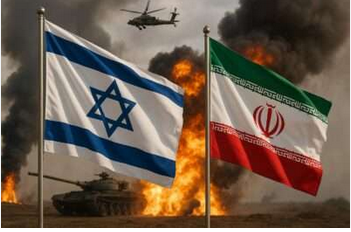Ancient Animosities, Modern Perils: Why the World Must End Iran’s War Against Israel In the ever-shifting sands of Middle Eastern politics, there are flashpoints that demand urgent attention not simply because of what has happened, but because of what may yet unfold. The latest escalation between Iran and Israel is one such case. And behind the headlines and hashtags lies a haunting truth: this is not a crisis born of recent provocations—it is the offspring of ancient animosities and a genocidal vision cloaked in ideology. Let us be clear. Israel did not provoke this conflict. It did not cross into Iranian territory or threaten its people. Iran and Israel are separated by roughly 2000 kilometers—about 1,200 miles of geography and vastly more in political and cultural terms. Israel poses no immediate existential threat to Iran. And yet, for decades, the Iranian regime has declared its unwavering intent to “wipe Israel off the map.” Not metaphorically. Literally. This is not rhetoric pulled from the dustbin of political bluster—it is doctrine. Chanted in military parades. Printed on state banners. Echoed by successive leaders in Tehran with a kind of manic fidelity. And the world, for far too long, has met this call for annihilation with averted eyes and muted tones. Let us also remember that Israel is not indifferent to threats of extinction. It carries the memory of six million reasons etched in its soul. The Holocaust is not ancient history for the Jewish people—it is a still-bleeding wound passed through generations. “Never again” is not a slogan. It is a policy. And when a sworn enemy amasses nuclear capabilities while simultaneously calling for their destruction, Israel’s reaction is not just understandable—it is inevitable. The recent Israeli strike that crippled key Iranian military infrastructure is not an act of aggression—it is a message. A sobering reminder that Israel will not sit back and wait for the mushroom cloud. It will act preemptively, decisively, and with conviction if its survival is at stake. Now, the world must act too. The time has come for the global community, and especially the Arab world, to stop indulging Iran’s delusions of holy war and start embracing a regional architecture of peace. Egypt took that bold step decades ago. Jordan followed. The Abraham Accords extended that vision further. Peace is not a betrayal of identity. It is the ultimate affirmation of civilization. If Africa—with its tribal scars, post-colonial rebirths, and mosaic of faiths—can pursue integration and dialogue, then surely the Middle East, cradle of both commerce and conflict, can chart a future beyond vengeance. This is not about choosing sides in a religious or ideological war. It is about choosing life over death, diplomacy over destruction, and reality over myth. The world must urge the Arab League to recognize Israel’s sovereignty and existence. And it must pressure Iran to abandon its messianic fantasies and join the community of responsible nations. Peace in the Middle East is possible. But not until the last missiles are dismantled—and the last genocidal chants are silenced.
Add A Comment


